Matt Rees's Blog, page 41
June 21, 2009
Review: The thriller that reminds us why Euro politics matter
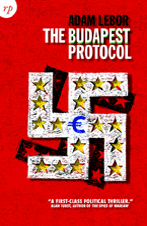
The Budapest Protocol, by Adam Lebor
(Reportage Press)
Sometimes a journalist comes across something so powerful that it seems bigger than the project he’s researching. Usually it’s put aside to serve as the basis for a future project, a magazine article or another nonfiction book.
Sometimes it takes such a grip on the writer’s imagination that there’s only one way to go. The novel. I know, because it’s how I turned from Middle East correspondent to the author of Palestinian crime fiction. Journalism seemed so limited by comparison, so unlikely to grab people and tell them “Pay attention, this really matters” the way a novel can.
That’s what happened to Adam Lebor in 1996 when he was researching his acclaimed “Hitler’s Secret Bankers: How Switzerland Profited from Nazi Genocide.” He stumbled upon a World War II intelligence dossier addressed to the US Secretary of State. It detailed a French agent’s report on German contingency plans for the economic takeover of Europe, should the Third Reich fail.
Lebor asked himself the question: what if the industrialists who intended to found this Fourth “economic” Reich had tried to do so, after the war? What if they had succeeded? (“What if,” as Stephen King notes in his “On Writing,” is the best place from which to start a thriller.)
From his vantage point as a correspondent based in Budapest, Lebor was able to see the massive inroads amounting more or less to takeover of post-Soviet economies by German and Austrian conglomerates. Add to that the growing centralization of the European Union and the introduction of its single currency forcing the economies of most of Europe to toe a single line, and you start to see why the Red House Report gripped him so.
The result is the chillingly real thriller “The Budapest Protocol,” published in the UK this month.
Alex Farkas, a local journalist, uncovers the economic conspiracy, which – as the novel unfolds – is focused on the election campaign of one of the conspirators as President of Europe (a post that many Brussels types would gladly see become reality). Farkas discovers plans for a new Holocaust against the Gypsies, which with the rise in these poor economic days of a neo-Nazi right-wing in Hungary is another of the novel’s moments of eerie realism.
What really drives Farkas, though, is the sinister murder of his grandfather, a survivor of the Budapest ghetto and a former dissident. That gives the novel the personal underpinning that elevates it above pure conspiracy theory. In fact, it makes it a first-rate thriller comparable to Robert Harris’s “Fatherland.” The novel reminds us that the politics of Europe remains more charged than the dull image the Brussels technocrats have lulled us into.
I’ll bet you’re sorry now you didn’t vote three weeks ago in the Euro elections. You will be after you read this novel.
Published on June 21, 2009 05:21
•
Tags:
budapest, crime, department, eastern, europe, fiction, futuristic, germany, hungary, jews, journalism, nonfiction, reviews, state, thrillers
June 18, 2009
Thriller Bugbear #69: Plot-Point Techno Madness!
Much as I love Nordic crime fiction, the Europewide megaseller “The Girl with the Dragon Tattoo” by Stieg Larsson made me want to throw knives like the Swedish chef on The Muppet Show. Why?
Two reasons.
First, the minor reason. Written by a (tragically deceased) Swedish journalist, the book is entirely in the style of a magazine article. Complete with page after page of “research.” It’d be enough for the author to tell me that Swedish women are often assaulted by men. I don’t need five pages of real background. A writer ought to understand that the greater the temptation for the reader to skim, the worse the book is. You end up with a good 250 page mystery trapped inside a 600 page monster.
Overloading with journalistic background is a common technique in contemporary thrillers and mysteries. It’s as though making things up was somehow a distortion of reality. Whereas it actually gets you a lot closer to reality than journalism or journalistic techniques, because it opens up the reader emotionally. (That’s what I’ve found with my Palestinian detective series.)
Second, the major reason. The Internet.
In “Dragon Tattoo,” the eponymous heroine is the now generic thriller/mystery character: the Internet hacker genius. Whenever Larsson needs to inject some new information or to unravel a tricky plot point, his hacker opens up her laptop and links into www.secretgovernmentinformation.com, the well-known (to fiction writers) site where all governments, in particular their intelligence networks, store material they want to be sure is available only to fictional hacker geniuses (and by proxy to thriller writers).
“Dragon Tattoo” isn’t the worst offender. Just the biggest seller.
But I’m only naming names here because poor old Larsson is dead. Those (here unnamed) living writers who use this technique ought to be ashamed of themselves.
In my novels the only time the Internet comes up is when detective Omar Yussef’s granddaughter sets up a website for him in her attempt to make him seem more professional. “The Palestine Agency for Detection,” as she calls her site, is merely embarrassing to Omar. No plot-point-shifting Houdini act there.
The Internet has essentially taken over from the Mossad as the thriller writer’s cure-all. In the old days, if there was something your main character couldn’t figure out, all he had to do was get in touch with the nearest Mossad agent, who’d be sure to know all the secrets in the world and was happy to pass them on with a few dark words about never forgetting the Holocaust and a cheerful “Shalom.”
As a resident of Israel, I can tell you the Mossad doesn’t operate that way. Neither does the Internet.
So stop writing books that pretend it does. (I wonder how you say that in Swedish...)
Two reasons.
First, the minor reason. Written by a (tragically deceased) Swedish journalist, the book is entirely in the style of a magazine article. Complete with page after page of “research.” It’d be enough for the author to tell me that Swedish women are often assaulted by men. I don’t need five pages of real background. A writer ought to understand that the greater the temptation for the reader to skim, the worse the book is. You end up with a good 250 page mystery trapped inside a 600 page monster.
Overloading with journalistic background is a common technique in contemporary thrillers and mysteries. It’s as though making things up was somehow a distortion of reality. Whereas it actually gets you a lot closer to reality than journalism or journalistic techniques, because it opens up the reader emotionally. (That’s what I’ve found with my Palestinian detective series.)
Second, the major reason. The Internet.
In “Dragon Tattoo,” the eponymous heroine is the now generic thriller/mystery character: the Internet hacker genius. Whenever Larsson needs to inject some new information or to unravel a tricky plot point, his hacker opens up her laptop and links into www.secretgovernmentinformation.com, the well-known (to fiction writers) site where all governments, in particular their intelligence networks, store material they want to be sure is available only to fictional hacker geniuses (and by proxy to thriller writers).
“Dragon Tattoo” isn’t the worst offender. Just the biggest seller.
But I’m only naming names here because poor old Larsson is dead. Those (here unnamed) living writers who use this technique ought to be ashamed of themselves.
In my novels the only time the Internet comes up is when detective Omar Yussef’s granddaughter sets up a website for him in her attempt to make him seem more professional. “The Palestine Agency for Detection,” as she calls her site, is merely embarrassing to Omar. No plot-point-shifting Houdini act there.
The Internet has essentially taken over from the Mossad as the thriller writer’s cure-all. In the old days, if there was something your main character couldn’t figure out, all he had to do was get in touch with the nearest Mossad agent, who’d be sure to know all the secrets in the world and was happy to pass them on with a few dark words about never forgetting the Holocaust and a cheerful “Shalom.”
As a resident of Israel, I can tell you the Mossad doesn’t operate that way. Neither does the Internet.
So stop writing books that pretend it does. (I wonder how you say that in Swedish...)
Lecture en francais a Jerusalem
Je fais une lecture en francais chez la librairie francaise a Jerusalem ce mois. Voici les detailles :
«Meurtre chez les Samaritains» de Matt Rees, Editions Albin Michel
Tout est possible en Palestine, et rien ne dit que le jeune Ishaq, le fils du prêtre des Samaritains de Naplouse, n’a pas été exécuté parce qu’il était homosexuel. Rien ne dit non plus que sa connaissance intime des caisses noires du Vieux, l’ancien Président de l’Autorité palestinienne, ne lui a pas été fatale. Après Le Collaborateur de Bethléem (qui vient de sortir en poche) et Une tombe à Gaza, qui ont installé Matt Rees comme l’un des maîtres du polar, cette troisième enquête d’Omar Youssef quadrille le labyrinthe de la casbah de l’antique cité de Cisjordanie et explore les arcanes de l’univers des Samaritains.
"Omar Youssef est le Marlowe de la rue arabe." NewYork Magazine
Matt REES sera à la librairie et signera ses livres le dimanche 28 Juin à 18h30
Librairie Vice-Versa
par téléphone: 02-6244412
par fax: 02-6244112
par mail: lib@viceversalib.com – Notre site: viceversalib.com
«Meurtre chez les Samaritains» de Matt Rees, Editions Albin Michel
Tout est possible en Palestine, et rien ne dit que le jeune Ishaq, le fils du prêtre des Samaritains de Naplouse, n’a pas été exécuté parce qu’il était homosexuel. Rien ne dit non plus que sa connaissance intime des caisses noires du Vieux, l’ancien Président de l’Autorité palestinienne, ne lui a pas été fatale. Après Le Collaborateur de Bethléem (qui vient de sortir en poche) et Une tombe à Gaza, qui ont installé Matt Rees comme l’un des maîtres du polar, cette troisième enquête d’Omar Youssef quadrille le labyrinthe de la casbah de l’antique cité de Cisjordanie et explore les arcanes de l’univers des Samaritains.
"Omar Youssef est le Marlowe de la rue arabe." NewYork Magazine
Matt REES sera à la librairie et signera ses livres le dimanche 28 Juin à 18h30
Librairie Vice-Versa
par téléphone: 02-6244412
par fax: 02-6244112
par mail: lib@viceversalib.com – Notre site: viceversalib.com
Published on June 18, 2009 00:42
•
Tags:
appearances, book, crime, fiction, france, israel, jerusalem, samaritan-s, secret, tour
June 14, 2009
Netanyahu holds his line
Israeli Prime Minister ignores Obama and reiterates same policies
by Matt Beynon Rees on Global Post
JERUSALEM — It’s as if Obama never happened.
Less than two weeks ago President Barack Obama laid out his plans for the Middle East in a speech in Cairo. He called for a freeze on Israeli settlement construction, among other things.
Israeli Prime Minister Benjamin Netanyahu immediately announced that he’d make a key policy address in Tel Aviv. Commentators wracked their brains figuring out how Bibi, the nickname by which the Likud leader is known, would walk the tightrope between his nationalist coalition — which is very supportive of the West Bank settlements and disdains the idea of a Palestinian state — and Obama, who had made it clear that he sees the settlements as Israel’s main contribution to the failure of peace efforts.
But Netanyahu outsmarted them all. No smokescreen, no artful diplospeak, no talking out of both sides of his mouth.
Nothing but old-school Bibi.
The big policy speech turned out to be filled with typical nationalist rhetoric about the settlements. The olive branch held out to the Palestinians was loaded with the kind of conditions Netanyahu surely knows are unacceptable in Ramallah — let alone Gaza.
“We would be prepared to reach agreement as to a demilitarized Palestinian state side by side with the Jewish state,” Netanyahu told his audience at the Begin-Sadat Center for Strategic Studies at Bar-Ilan University in Tel Aviv.
He said “Palestinian state,” but he added an adjective that grates rather hard on the Palestinian ear: “demilitarized.” For Netanyahu that’s important because a militarized Palestinian state would, as he sees it, be much as Gaza is today, with the capacity to rain missiles on Tel Aviv and the country’s international airport. It could make a military alliance with Iran, like Hezbollah on Israel’s northern border and Hamas in Gaza. We’ve all seen how that turned out for Israel.
To Palestinians, a demilitarized state sounds like no state at all. Chief Palestinian negotiator Saeb Erekat said Netanyahu would “wait a thousand years to meet a Palestinian who’d accept his conditions.”
As for Obama’s gripe about settlements, Netanyahu seemed at first to be edging toward a compromise, something so cunning in its apparent straightforwardness that no one would notice he’d refused to comply with the American demands. “We have no intention of founding new settlements,” he said.
Well, that’s not the heart of Obama’s argument. He doesn’t want to be deflected by Israel pulling out of a few remote hilltop outposts. The U.S. wants even existing settlements to stay as they are — not growing by so much as a single brick — until the future of the land on which they stand is decided.
But Netanyahu trotted out the same formula Israel has always used for evading a settlement freeze: so-called natural growth. “We must give mothers and fathers the chance of bringing up their children as is the case anywhere in the world,” he said.
In other words, if children grow up in a settlement, Israel is bound to build a home for them there when they want to have their own place, so they don’t have to move elsewhere to find accommodation.
As if their parents didn’t move to the settlements from somewhere else.
As if Barack Obama didn’t insist there be no “natural growth” in the settlements.
No one expects Netanyahu to go head to head with Obama. The speech wasn’t intended as a gauntlet in the face of the U.S. But the Israeli prime minister is sailing pretty close to the White House wind.
It all played well with Netanyahu’s right-wing Likud Party. “It was a Zionist speech from his faith and heart,” said Limor Livnat, a leading Likud hawk. “I’d have preferred he hadn’t said ‘Palestinian state,’ but it was a good speech.”
The country’s rather lackluster opposition recognized that Netanyahu hadn’t given ground to Obama. “The speech was typical Netanyahu,” said Ofer Pines, a legislator from the Labor Party (Labor is part of the coalition, but some of its lawmakers including Pines refused to join the government.) “He said a very small ‘Yes,’ and a very big ‘No.’ He’s really only talking to himself.”
Except he’s not the only one listening. There must surely have been bemusement in Washington, as officials watched the speech, waiting for Netanyahu to adjust his previous positions.
Wait on. The Palestinians must recognize Israel as a Jewish state, he said. Jerusalem, too, “would be the united capital of Israel.” He didn’t even offer to open the checkpoints into Gaza to let in construction material to rebuild the city ruined in the war between Israel and Hamas at the turn of the year.
The most optimistic of assessments — at least among those who oppose Netanyahu — was that the speech was just words. “It’s not what he says, it’s what he does after this that interests me,” said Haim Ramon, a legislator from the opposition Kadima Party.
Obama will surely second that.
by Matt Beynon Rees on Global Post
JERUSALEM — It’s as if Obama never happened.
Less than two weeks ago President Barack Obama laid out his plans for the Middle East in a speech in Cairo. He called for a freeze on Israeli settlement construction, among other things.
Israeli Prime Minister Benjamin Netanyahu immediately announced that he’d make a key policy address in Tel Aviv. Commentators wracked their brains figuring out how Bibi, the nickname by which the Likud leader is known, would walk the tightrope between his nationalist coalition — which is very supportive of the West Bank settlements and disdains the idea of a Palestinian state — and Obama, who had made it clear that he sees the settlements as Israel’s main contribution to the failure of peace efforts.
But Netanyahu outsmarted them all. No smokescreen, no artful diplospeak, no talking out of both sides of his mouth.
Nothing but old-school Bibi.
The big policy speech turned out to be filled with typical nationalist rhetoric about the settlements. The olive branch held out to the Palestinians was loaded with the kind of conditions Netanyahu surely knows are unacceptable in Ramallah — let alone Gaza.
“We would be prepared to reach agreement as to a demilitarized Palestinian state side by side with the Jewish state,” Netanyahu told his audience at the Begin-Sadat Center for Strategic Studies at Bar-Ilan University in Tel Aviv.
He said “Palestinian state,” but he added an adjective that grates rather hard on the Palestinian ear: “demilitarized.” For Netanyahu that’s important because a militarized Palestinian state would, as he sees it, be much as Gaza is today, with the capacity to rain missiles on Tel Aviv and the country’s international airport. It could make a military alliance with Iran, like Hezbollah on Israel’s northern border and Hamas in Gaza. We’ve all seen how that turned out for Israel.
To Palestinians, a demilitarized state sounds like no state at all. Chief Palestinian negotiator Saeb Erekat said Netanyahu would “wait a thousand years to meet a Palestinian who’d accept his conditions.”
As for Obama’s gripe about settlements, Netanyahu seemed at first to be edging toward a compromise, something so cunning in its apparent straightforwardness that no one would notice he’d refused to comply with the American demands. “We have no intention of founding new settlements,” he said.
Well, that’s not the heart of Obama’s argument. He doesn’t want to be deflected by Israel pulling out of a few remote hilltop outposts. The U.S. wants even existing settlements to stay as they are — not growing by so much as a single brick — until the future of the land on which they stand is decided.
But Netanyahu trotted out the same formula Israel has always used for evading a settlement freeze: so-called natural growth. “We must give mothers and fathers the chance of bringing up their children as is the case anywhere in the world,” he said.
In other words, if children grow up in a settlement, Israel is bound to build a home for them there when they want to have their own place, so they don’t have to move elsewhere to find accommodation.
As if their parents didn’t move to the settlements from somewhere else.
As if Barack Obama didn’t insist there be no “natural growth” in the settlements.
No one expects Netanyahu to go head to head with Obama. The speech wasn’t intended as a gauntlet in the face of the U.S. But the Israeli prime minister is sailing pretty close to the White House wind.
It all played well with Netanyahu’s right-wing Likud Party. “It was a Zionist speech from his faith and heart,” said Limor Livnat, a leading Likud hawk. “I’d have preferred he hadn’t said ‘Palestinian state,’ but it was a good speech.”
The country’s rather lackluster opposition recognized that Netanyahu hadn’t given ground to Obama. “The speech was typical Netanyahu,” said Ofer Pines, a legislator from the Labor Party (Labor is part of the coalition, but some of its lawmakers including Pines refused to join the government.) “He said a very small ‘Yes,’ and a very big ‘No.’ He’s really only talking to himself.”
Except he’s not the only one listening. There must surely have been bemusement in Washington, as officials watched the speech, waiting for Netanyahu to adjust his previous positions.
Wait on. The Palestinians must recognize Israel as a Jewish state, he said. Jerusalem, too, “would be the united capital of Israel.” He didn’t even offer to open the checkpoints into Gaza to let in construction material to rebuild the city ruined in the war between Israel and Hamas at the turn of the year.
The most optimistic of assessments — at least among those who oppose Netanyahu — was that the speech was just words. “It’s not what he says, it’s what he does after this that interests me,” said Haim Ramon, a legislator from the opposition Kadima Party.
Obama will surely second that.
June 13, 2009
A living foreign correspondent the most useless thing to media industry -- Reviewing a "Novel of Jihad"
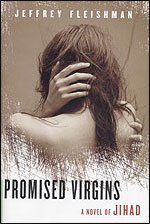
The magazine of Harvard's Nieman Fellowship asked me to write an essay about Jeffrey Fleishman's "Promised Virgins: A Novel of Jihad". I wrote about why international correspondents like me and Fleishman, Cairo bureau chief for the LA Times, turn to novels to express the depth of what we learn about a foreign culture. Here's how the article begins:
Jay Morgan, the central character of Jeffrey Fleishman’s thought provoking “novel of Jihad,” carries an undeveloped roll of film shot by his young photographer wife in the moments before she was killed in Beirut. Morgan lifts her wounded body to safety, but she dies anyway. It’s a fitting image on which to build Morgan’s deep bitterness and disillusion about journalism as he covers the war in Kosovo. In these days of cyberjournalism, idiotic reader “talkbacks” and nonsensical newsroom cutbacks, the only thing apparently more useless to the media industry than an undeveloped film or a dead photographer is a living foreign correspondent.
The story of “Promised Virgins” revolves around Morgan’s trek through the mountains as he interviews Serbs, Albanians and CIA operatives on the hunt for a newly arrived jihadi who has brought Islamic fundamentalism to the otherwise nationalistic Muslims of Kosovo. In truth, the book is about a foreign correspondent’s uncomfortable personal connections with the society he covers and his realization that they’re the only things keeping him from despair at his ever-shabbier trade. Read more...
Published on June 13, 2009 23:59
•
Tags:
balkans, bethlehem, collaborator, crime, east, fiction, islam, jihadi, journalism, kosovo, literature, middle, murders, religion, thrillers
Grassroots signs for my Palestinian crime novels
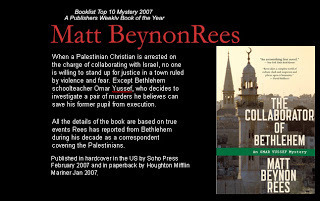
A new review in the Ann Arbor Chronicle suggests healthy grassroots popularity for my Palestinian crime novels. The review of my first Palestinian crime novel "The Collaborator of Bethlehem" (UK Title: The Bethlehem Murders) is written by Robin Agnew, owner of Aunt Agatha's Mystery Bookstore in Ann Arbor. She writes: "When enough customers ask you about a certain author in a short period of time, it makes you take notice. When several of my more discerning “guy” readers mentioned Matt Rees as a wonderful writer, I was intrigued enough to pick up the first book."
Robin goes on to say:"Rees is able – like the very best of novelists – to convey absolute horror without sentimentality. Some of the things that happen in this book will probably haunt you, but they also seem like things that can and do happen. The real bit of grace in the book is the way Yussef chooses to deal with what happens. He shows that even a somewhat frail 56 year old can find a reason to move ahead in the world. I can’t recommend this book highly enough." Read the full review in The Ann Arbor Chronicle.
June 10, 2009
Whingers and Warm Guns: Happy-Guru Eric Weiner's Writing Life
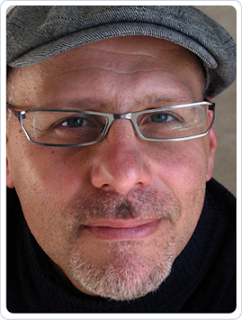
What’s happiness? A large income, Jane Austen said. Absolute ignorance, according to the delightfully morbid Grahame Greene. Or John Lennon’s less delightfully morbid warm gun. Whatever else it is, happiness is done to death. But where it is? That’s something new. The genius of Eric Weiner’s New York Times bestseller “The Geography of Bliss: One Grump’s Search for the Happiest Places in the World” is to change the way of searching for happiness. Instead of looking for ways to make himself happy (the typically American individualistic approach to joy), he went out to find places where other people were happy. That way the former NPR correspondent (I got to know him when he was Mideast bureau chief, but he was based in India, too, for a time) was able to identify broader characteristics of a society that create happiness. He found, of course, that being Swiss helps (they trust everyone around them and therefore don’t have to worry and watch their backs). Being Moldovan on the other hand definitely doesn’t help -- everyone cheats, nothing's fair = miserable place. On his journey Eric also ditched email. But he broke that rule for the sake of my blog, and I’m glad he did.
How long did it take you to get published?
It took me three weeks to find an agent and publisher. It took twelve years for me to settle on an idea that I was passionate about.
Would you recommend any books on writing?
No. I think the best way to learn to write is to write. Reading (everything and anything) helps, too. So does coffee.
What’s a typical writing day?
I wake up bright and early, and by 8:00 a.m. settle into my office. Then I check my e-mail. Then I check Facebook. Then I check a few of my favorite blogs. Then I break for lunch. Usuallly, after lunch, I will do some actual writing before calling it a day.
Plug your latest book. What’s it about? Why’s it so great?
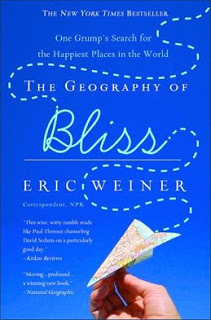
You're asking a writer to plug his own work? Okay, if you insist. My book, The Geography of Bliss, is brilliant because it takes a fairly tried subject, happiness, and gives it a new twist. Most happiness books focus on the what of happiness; I was interested in the where. Which are the world's happiest countries and what can we learn from them? And--did I mention?--the writing is brilliant! Funny and serious at the same time. I would highly recommend it. Really.
How much of what you do is:
a) formula dictated by the genre within which you write?
b) formula you developed yourself and stuck with?
c) as close to complete originality as it’s possible to get each time?
Mainly b), I think, with a smattering of c). My genre, broadly speaking, is travelogue. It is an odd, self-loathing genre. Many of the great travel writers don't like to be called travel writers. I think that's because travel writing sounds fluffy and inconsequential. At least bad travel writing is like that. Good travel writing is simply good writing that happens to use place as its main construct. In my work, I try to fashion a slightly new genre, the travelogue of ideas. In that sense, my book isn't really travel book at all. It's a book about the nature of happiness that uses geography as a way to get at this mystery.
Where is your favorite place to write?
I like coffee shops. The background din, oddly, helps me focus. After a while, though, I get antsy and feel the need to move. I might write in two or three different places in a single day. After all, I am a travel writer. Place matters.
Who is your favorite travel writer?
Jan Morris. She can get to the heart of a place in a few sentences. She is opinionated, but not obnoxiously so. She puts herself in her writing but never gets in the way of a good story. And she can be funny in all the right places.
What do you do if you are stuck?
I drink more coffee. If that doesn't work, (and it usually doesn't) I go for a walk. If that doesn't work (and it usually doesn't) I read what I have written aloud. I tend to write for the ear, and reading aloud can help me regain my rhythm. Also, I recently discovered a wine called "Writer's Block." It's a very nice Zinfandel.
What do you read for pleasure?
I like big fat books that tackle big fat topics. I'm currently reading Peter Watson's Ideas; A History of Thought and Invention from Fire to Freud. It's easily 800 pages. I'm still in the fire bit.
How much research is involved in each of your books?
An awful lot. For The Geography of Bliss, I read everything I could get my hands on about happiness, from Aristotle to Marty Seligmen, the poo-bah of the "science of happiness." I camped out at a university library for weeks on end. For a while, I was concerned that I was over-researching, but now I dont' think there is such a thing. Many morsels from my research made their way into the final manuscript.
What’s your experience with being translated?
My book has been translated into 13 languages, The publishers send me copies, which is nice. I can't understand a word of them,. for all I know they did a terrible job of translating. But they look nice on my bookshelf. Especially the Korean edition. Very colorful.
Do you live entirely off your writing?
I do make a living off my writing. I consider myself very fortunate.
How many books did you write before you were published?
This is my first one. Non-fiction, though, is a lot easier to get published than fiction.
What’s the strangest thing that happened to you on a book tour?
I had just completed an interview with a radio station in Portland, Oregon, when the interviewer said, "That was really great, Do you want to smoke some weed?" It's true. I might have taken him up on it, but I had a book reading in a couple of hours, so I politely declined.
What’s your weirdest idea for a book you’ll never get to publish?
I'd like to write a travel book about time travel. I would go back in time to an age when there still were undiscovered places to explore and write about them. I'd also buy some choice real estate in Manhattan. Then I'd travel back to the present and live large.
Published on June 10, 2009 01:11
•
Tags:
east, eric, happiness, interviews, journalism, life, literature, middle, nonfiction, weiner, writing
June 7, 2009
Can't wait for The Corruptionist
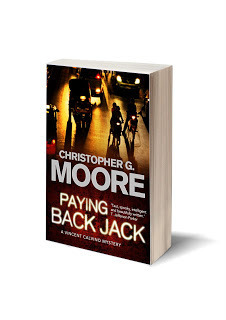
I heard from my chum Christopher G. Moore that he just finished writing the 11th in his series of Vincent Calvino crime novels set in Bangkok. That's good news, because I already read his brilliant and forthcoming Paying Back Jack. (See my review "Elmore Leonard in Bangkok"). Knowing Chris's work, I already love The Corruptionist -- I'm enjoying guessing how he'll use that terrific title and his vibrant cast of characters to take us on another superbly original dive into the underworld of Bangkok.
On his blog, Chris recently wrote about my latest Palestinian crime novel, The Samaritan's Secret. I'm delighted he enjoyed it -- not only because I'm such an admirer of his writing, but also because we share a birthday/a UK publisher/a style of examining the foreign culture in which we live through gritty crime fiction which exposes something you'd never expect about the place. Here's what he wrote:
"Matt Beynon Rees is another author who knows the territory, the people, and the nature of the personal conflicts that separate them. Matt’s turf is Palestine, and his novels are brim with people caught in the vice of poverty, tribal and clan conflict, and facing the constant possibility of violence. He brings Palestine to life. And that is no easy thing.
"One of Matt’s Omar Yussef mysteries does more to take a person into the day-to-day reality of the lives of people in Gaza than a library of newspaper and magazine analysis of Middle East politics. Ultimately understanding countries like the Palestine and North Korea are tied to their history, language, enemies, and traditions. The reality of such a country becomes understandable through emotional lens of the people who live there. Matt channels the sensibility of Graham Greene in this series, building a picture of a time and place that stays with you long after you finish the book."
So while you're waiting for The Corruptionist, get stuck into the first 10 Calvino novels. You won't be disappointed.
Published on June 07, 2009 07:21
•
Tags:
asian, bangkok, calvino, christopher, corruptionist, crime, g, jesus, moore, nablus, omar, palestine, samaritan-s, samaritans, secret, thailand, vincent, yussef
June 5, 2009
Look out, God--Here's Shalom Auslander's Writing Life interview
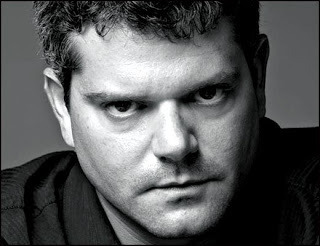
“Fuck,” said God. …That’s a line from one of the short-stories in Shalom Auslander’s “Beware of God.” I live in the Middle East, so I feel like I hear God saying “Fuck!” almost every day. (If He doesn’t, then He’s not reading the newspapers.) “Beware of God” nails faith and the faithful as only a genius of satire can do. A very angry genius of satire, I ought to point out. As you’ll discover with Auslander’s second book “The Foreskin’s Lament.” It’s a memoir of Auslander’s Orthodox Jewish upbringing in a family as scarred as a lamenting eight-day-old foreskin. Here’s my interview with America’s scourge of religion.
How long did it take you to get published?
Not as long as it took me to write. I didn’t grow up wanting to be a writer; it wasn’t until I was in my early 20’s that I realized how badly I wanted to burn the world to the ground, and writing was the most immediate way I could do that. Once I started writing, getting published came soon after.
Would you recommend any books on writing?
No, and I read them all. And what I realized is that no matter what advice might be found inside, there’s an admission in just looking for help that “I can’t do this.” Writing needs to come from a ludicrous sense of self-assurance (combined with a terrifying degree of insecurity).
What’s a typical writing day?
Wake. Ride to my office. Delay. Delay. Delay. Get angry at myself. Write.
Plug your latest book. What’s it about? Why’s it so great?
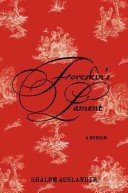
“Foreskin’s Lament” is a memoir of growing up in an emotionally dysfunctional and religiously stifling home. It may or not be great, but it’s honest, and full of rage, which is nice.
What’s your favorite sentence in all literature, and why?
“The sun shone, having no alternative, on the nothing new.” Beckett, first sentence of ‘Murphy.’ Taking the most joyful part of the day and bending it, by perception, into something utterly bleak. Mazel tov.
How much research is involved in each of your books?
I research my books a lot, because research is easy and feels constructive while it really just kills time. “Wow,” I can say at the end of the day when I’ve written nothing, “That was a productive day!”
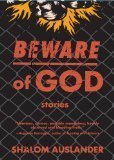
Do you have a pain from childhood that compels you to write? If not, what does?
A pain? You mean one? No.
What’s the best idea for marketing a book you can do yourself?
Have courage. Write a book that will shake up the world. Writing isn’t war, but at it’s best, it’s a bit like terrorism – take a small, 200-page bomb, plant it in the holiest place you can find, and kaboom. Candide was a bomb. Huck Finn was a bomb. Catch-22 was a bomb.
What’s your experience with being translated?
Mostly good. Translators who think of books as literature upset me, because they won’t translate “cocksucker” as “cocksucker.” They’ll try to soften it, try to “elevate” the book into something weak and mealy. “Cocksucker” is not the same as “homosexual.” Someone who is a motherfucker is a motherfucker, not a “jerk” or a “cad.”
Do you live entirely off your writing?
No. I work part-time for Satan in a Manhattan marketing firm.
How many books did you write before you were published?
One.
What’s the strangest thing that happened to you on a book tour?
Angry Orthodox Jews accosted me, told me I was a heretic and a heathen and was finishing what Hitler started. “Did you read the book?” I asked. “No,” said God’s inexplicably chosen ones. “And we don’t want to.” Sigh.
What’s your weirdest idea for a book you’ll never get to publish?
I have this idea for a book that claims to be the Word of God and that tells the story of how the Earth came to be. But who the fuck is going to believe that?
June 4, 2009
Python mistakes Palestinians for Buddhists
Last week at the Palestine Literature Festival, Michael Palin produced some of his funniest material since his Monty Python heyday. However, he probably didn’t intend it to be funny.
Palin told an audience that was rather lacking in actual Palestinians – mainly locally based international aid workers, diplomats and heaven knows who else – that he had seen how Israeli checkpoints worked. He thought it’d be a good idea to “always look on the bright side of life” and see the checkpoints as an opportunity for Palestinians to slow down. It saves them, he suggested, from the kind of frenetic pace that drives people crazy in other places, where there are no checkpoints.
A few attendees were perturbed by Palin’s comments. After all, the point of the checkpoints is less to slow down Palestinians and, more frequently, to prevent them moving about at all. Still he got off lightly. In Palestine, everybody expects the Spanish Inquisition…
I think Palin’s remarks were delightful. He’s trying to find something good about an aspect of life which most people only see as wicked and frustrating. Always look on the bright side of life, right?
It’s not his fault if he mistook the Palestinians for Buddhists.
Palin told an audience that was rather lacking in actual Palestinians – mainly locally based international aid workers, diplomats and heaven knows who else – that he had seen how Israeli checkpoints worked. He thought it’d be a good idea to “always look on the bright side of life” and see the checkpoints as an opportunity for Palestinians to slow down. It saves them, he suggested, from the kind of frenetic pace that drives people crazy in other places, where there are no checkpoints.
A few attendees were perturbed by Palin’s comments. After all, the point of the checkpoints is less to slow down Palestinians and, more frequently, to prevent them moving about at all. Still he got off lightly. In Palestine, everybody expects the Spanish Inquisition…
I think Palin’s remarks were delightful. He’s trying to find something good about an aspect of life which most people only see as wicked and frustrating. Always look on the bright side of life, right?
It’s not his fault if he mistook the Palestinians for Buddhists.
Published on June 04, 2009 07:04
•
Tags:
checkpoints, israel, israelis, literature, michael, monty, palestine, palestinians, palin, python



